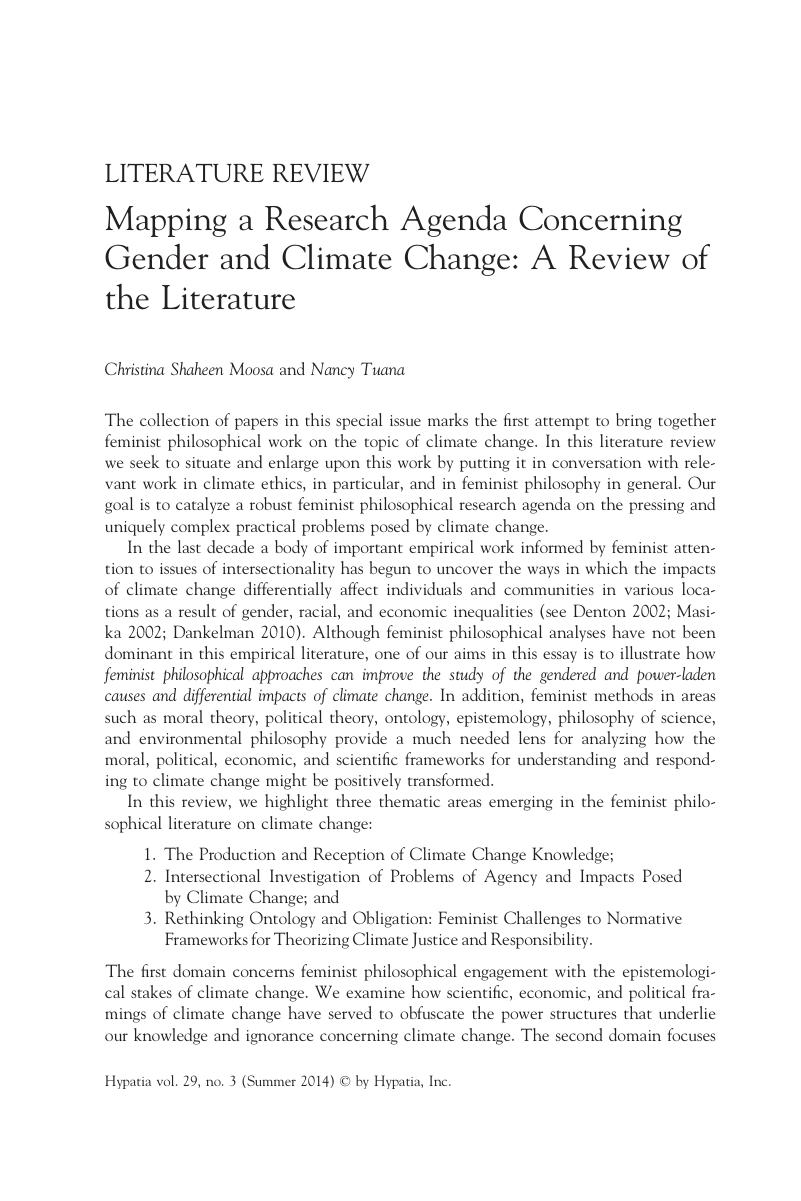Crossref Citations
This article has been cited by the following publications. This list is generated based on data provided by Crossref.
Leap, Braden
2015.
Redefining the Refuge: Symbolic Interactionism and the Emergent Meanings of Environmentally Variable Spaces.
Symbolic Interaction,
Vol. 38,
Issue. 4,
p.
521.
Adams, Matthew
2016.
Ecological Crisis, Sustainability and the Psychosocial Subject.
p.
175.
Carey, Mark
Jackson, M.
Antonello, Alessandro
and
Rushing, Jaclyn
2016.
Glaciers, gender, and science.
Progress in Human Geography,
Vol. 40,
Issue. 6,
p.
770.
Makina, Anesu
and
Moyo, Theresa
2016.
Mind the gap: institutional considerations for gender-inclusive climate change policy in Sub-Saharan Africa.
Local Environment,
Vol. 21,
Issue. 10,
p.
1185.
Sorensen, Cecilia
Saunik, Sujata
Sehgal, Meena
Tewary, Anwesha
Govindan, Mini
Lemery, Jay
and
Balbus, John
2018.
Climate Change and Women's Health: Impacts and Opportunities in India.
GeoHealth,
Vol. 2,
Issue. 10,
p.
283.
Lendelvo, Selma
N. Angula, Margaret
Mogotsi, Immaculate
and
Aribeb, Karl
2018.
Natural Hazards - Risk Assessment and Vulnerability Reduction.
Enarson, Elaine
Fothergill, Alice
and
Peek, Lori
2018.
Handbook of Disaster Research.
p.
205.
Sorensen, Cecilia
Murray, Virginia
Lemery, Jay
and
Balbus, John
2018.
Climate change and women's health: Impacts and policy directions.
PLOS Medicine,
Vol. 15,
Issue. 7,
p.
e1002603.
Jerneck, Anne
2018.
Taking gender seriously in climate change adaptation and sustainability science research: views from feminist debates and sub-Saharan small-scale agriculture.
Sustainability Science,
Vol. 13,
Issue. 2,
p.
403.
Jerneck, Anne
2018.
What about Gender in Climate Change? Twelve Feminist Lessons from Development.
Sustainability,
Vol. 10,
Issue. 3,
p.
627.
Hayhurst, Lyndsay M. C.
and
del Socorro Cruz Centeno, Lidieth
2019.
“We Are Prisoners in Our Own Homes”: Connecting the Environment, Gender-Based Violence and Sexual and Reproductive Health Rights to Sport for Development and Peace in Nicaragua.
Sustainability,
Vol. 11,
Issue. 16,
p.
4485.
Rao, Nitya
Mishra, Arabinda
Prakash, Anjal
Singh, Chandni
Qaisrani, Ayesha
Poonacha, Prathigna
Vincent, Katharine
and
Bedelian, Claire
2019.
A qualitative comparative analysis of women’s agency and adaptive capacity in climate change hotspots in Asia and Africa.
Nature Climate Change,
Vol. 9,
Issue. 12,
p.
964.
Walker, Heidi M.
Culham, Angela
Fletcher, Amber J.
and
Reed, Maureen G.
2019.
Social dimensions of climate hazards in rural communities of the global North: An intersectionality framework.
Journal of Rural Studies,
Vol. 72,
Issue. ,
p.
1.
Rao, Nitya
Lawson, Elaine T.
Raditloaneng, Wapula N.
Solomon, Divya
and
Angula, Margaret N.
2019.
Gendered vulnerabilities to climate change: insights from the semi-arid regions of Africa and Asia.
Climate and Development,
Vol. 11,
Issue. 1,
p.
14.
Call, Maia
and
Sellers, Samuel
2019.
How does gendered vulnerability shape the adoption and impact of sustainable livelihood interventions in an era of global climate change?.
Environmental Research Letters,
Vol. 14,
Issue. 8,
p.
083005.
Jordan, J. C.
2019.
Deconstructing resilience: why gender and power matter in responding to climate stress in Bangladesh.
Climate and Development,
Vol. 11,
Issue. 2,
p.
167.
Webb, Julie
2020.
What difference does disaster risk reduction make? Insights from Vanuatu and tropical cyclone Pam.
Regional Environmental Change,
Vol. 20,
Issue. 1,
Hurlbert, Margot
and
Fletcher, Amber J.
2020.
Indigenous rights in the context of oil and gas pipelines in Canada: exposing naturalised power structures through a lens of intersectionality.
International Journal of Law in Context,
Vol. 16,
Issue. 1,
p.
57.
van Luijk, Nicolien
Giles, Audrey R.
and
Hayhurst, Lyndsay M. C.
2020.
Sport and the Environment.
p.
47.
Löw, Christine
2020.
Gender and Indigenous concepts of climate protection: a critical revision of REDD+ projects.
Current Opinion in Environmental Sustainability,
Vol. 43,
Issue. ,
p.
91.



